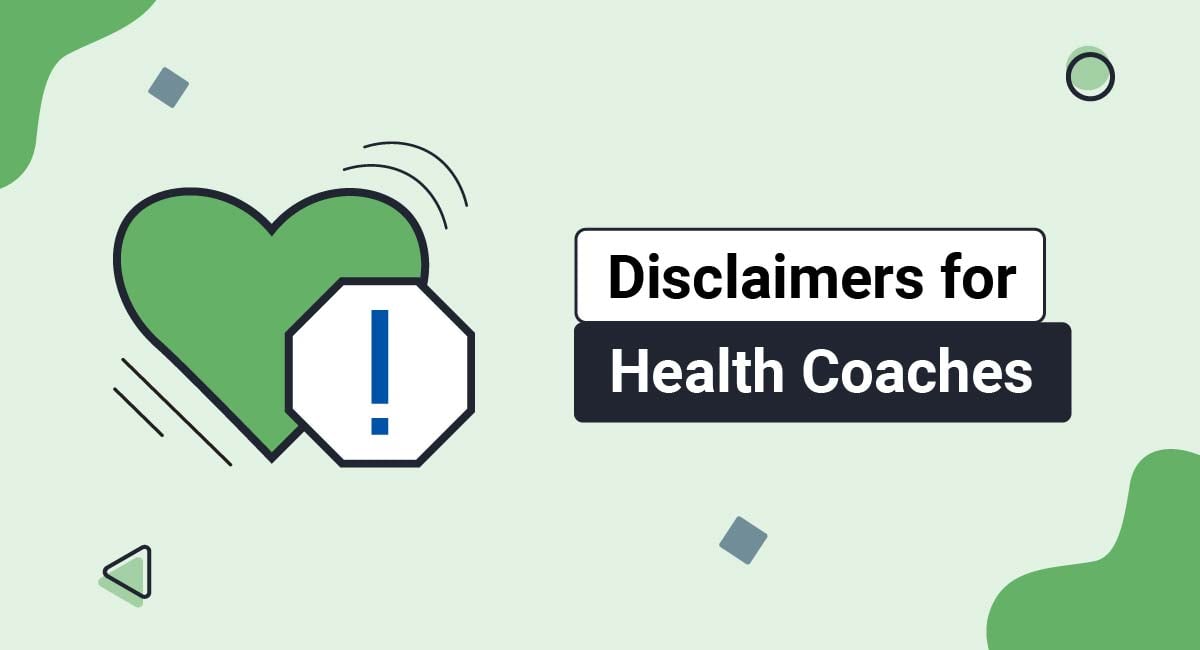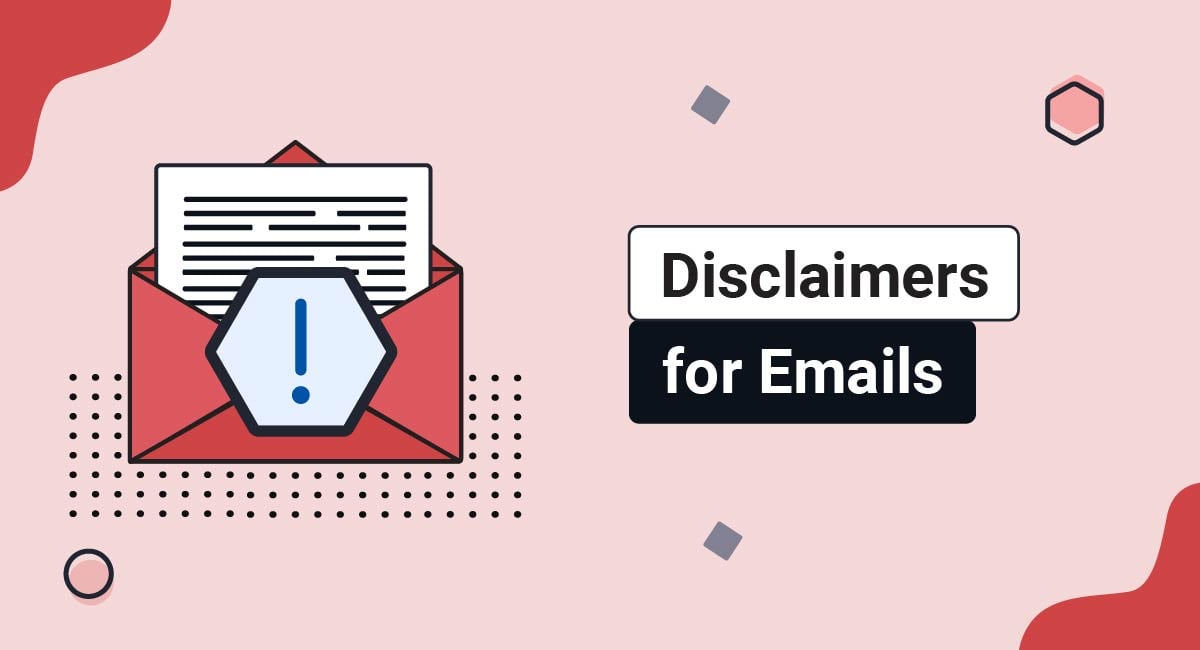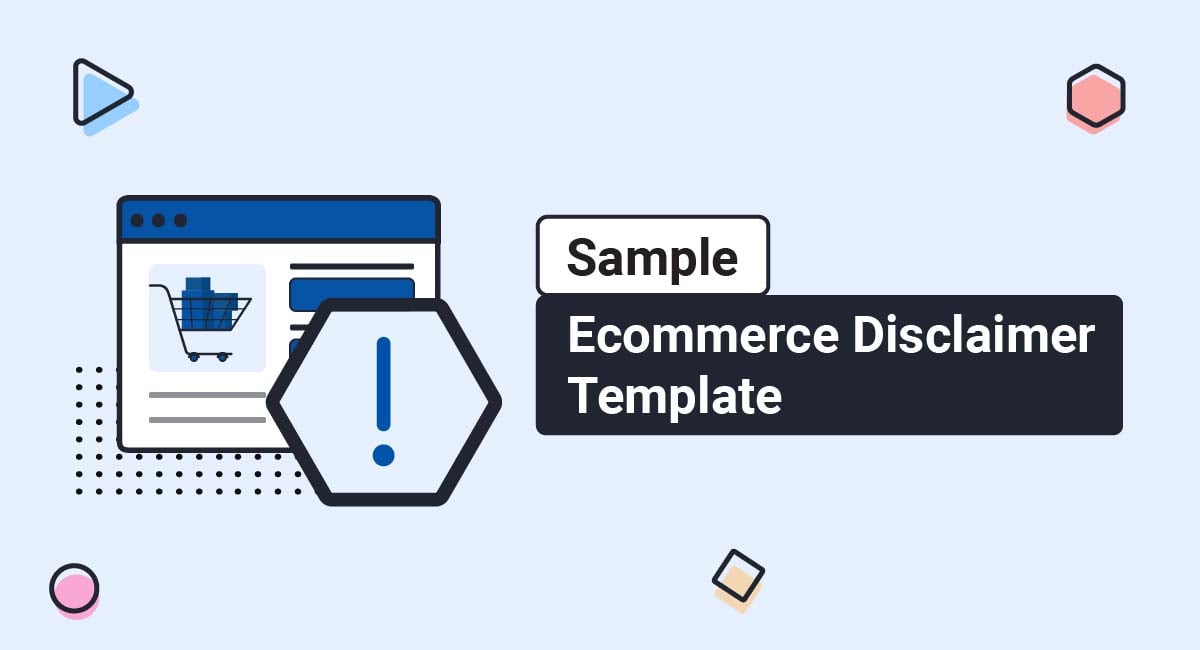As a health coach, you are committed to helping your clients create lifestyle changes that will improve their overall health. In order to help your clients achieve their goals, it's important that they know what they can expect from you and what your limitations are.
Including disclaimers on your online platforms can help potential customers understand what results they can expect and what they need to take personal responsibility for.
Our Disclaimer Generator can generate a legal disclaimer for your business, website or mobile app. Just follow these steps:
-
At Step 1, select where your Disclaimer will be used.
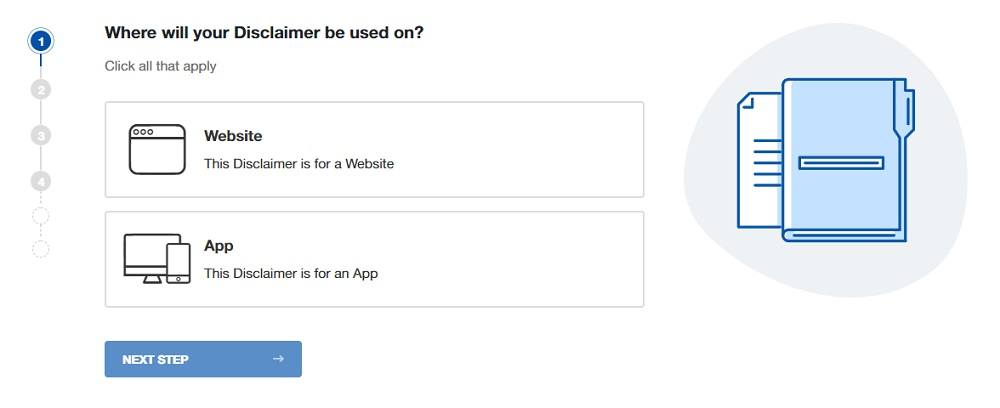
-
At Step 2, add in information about your website/app and business.
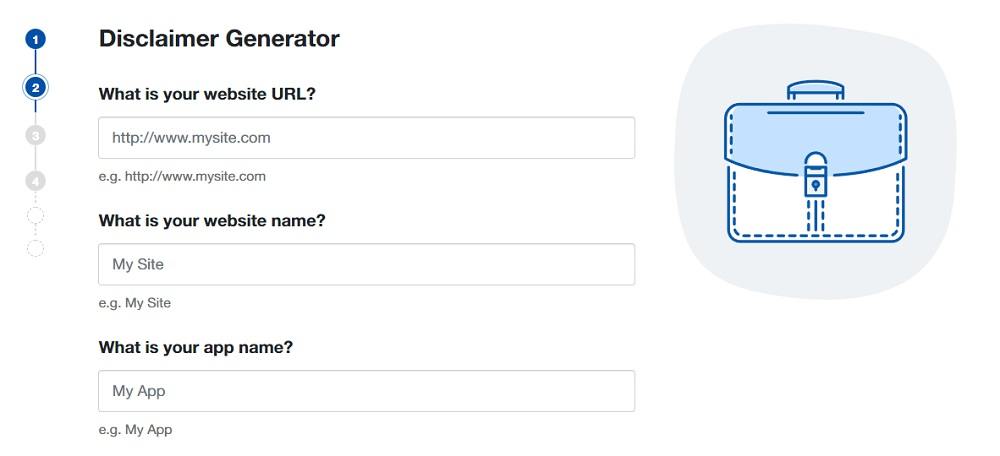
-
Answer some questions about your business practices.
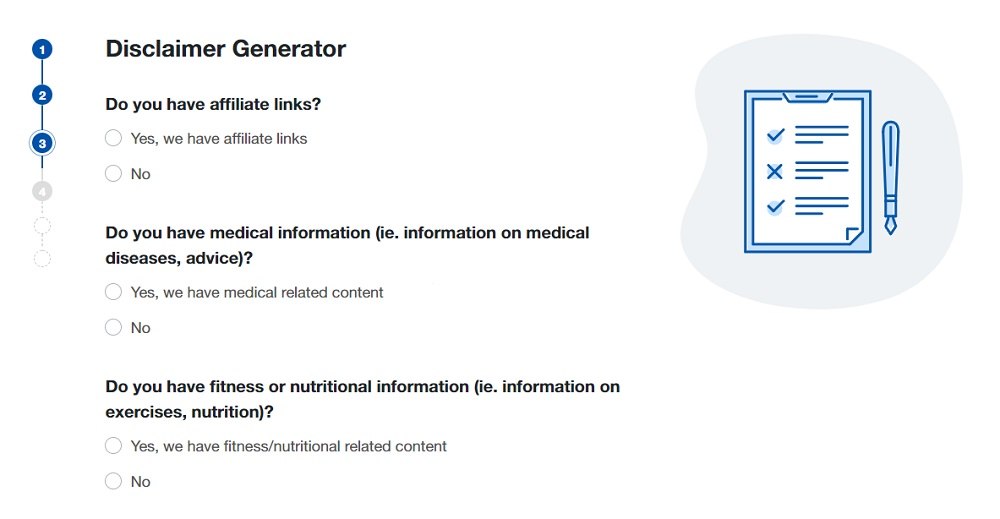
-
Enter an email address where you'd like to receive your Disclaimer and click "Generate."
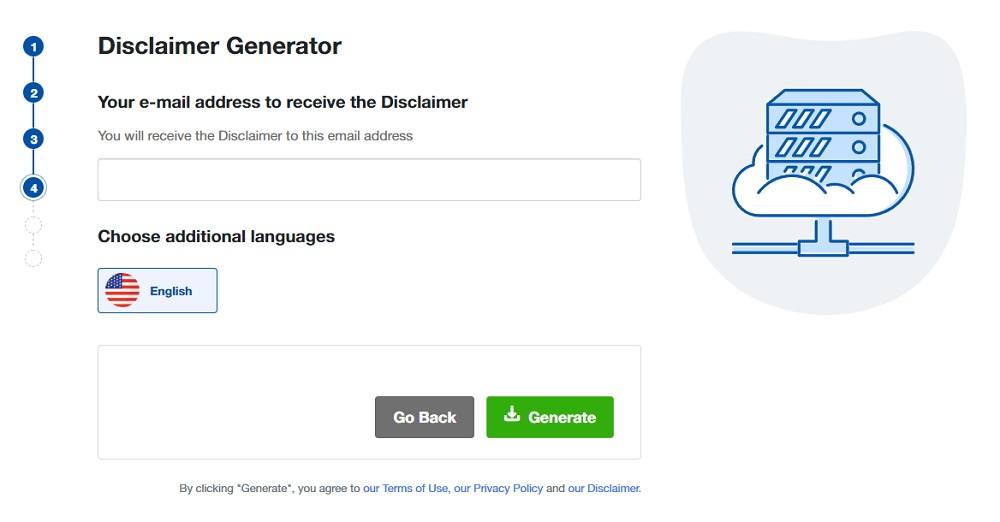
Done! You'll be able to instantly access and download your new Disclaimer.
- 1. What are Disclaimers?
- 2. Why Health Coaches Need Disclaimers
- 3. What Kinds of Disclaimers Health Coaches Need
- 3.1. Not Medical Advice Disclaimer
- 3.2. Affiliate Disclaimer
- 3.3. Copyright Notice Disclaimer
- 3.4. Email Disclaimer
- 3.5. Errors and Omissions Disclaimer
- 3.6. External Links Disclaimers
- 3.7. Fair Use Disclaimer
- 3.8. Financial Disclaimer
- 3.9. No Responsibility Disclaimer
- 3.10. Reviews Disclaimers
- 3.11. Use at Your Own Risk Disclaimer
- 3.12. Views Expressed Disclaimer
- 3.13. Warranty Disclaimers
- 4. Where to Display Disclaimers for Health Coaches
- 4.1. Website
- 4.2. Mobile Apps
- 4.3. Email
- 5. Summary
What are Disclaimers?
A disclaimer is a statement that is meant to lower or eliminate your legal liability. Disclaimers are used to inform users of any information that your Terms and Conditions agreement might not cover. Your Terms and Conditions is a document that outlines the kind of behavior that users must agree to in order to use your online services.
Keep in mind that while disclaimers should serve to cover any gaps in your Terms and Conditions, they are not always legally enforceable.
Why Health Coaches Need Disclaimers
A disclaimer can serve an educational purpose for your users as well as offer potential legal protection. While most disclaimers are optional, it's a good idea to include them on your online platforms in order to let users know what you take responsibility for and what is beyond the scope of your coaching business.
It's also important to know when disclaimers are legally required. For example, many health coaches work with affiliates. The Federal Trade Commission (FTC) requires an affiliate disclaimer for anyone who includes affiliate links on their website.
You will also want to include a health disclaimer if you are providing health or medical opinions. A health disclaimer can be used to inform users that they should consult with a medical professional as needed before taking part in your programs or courses.
Disclaimers can also be used to let users know that results may vary, and can protect you from liability for damages that may occur.
What Kinds of Disclaimers Health Coaches Need

A few of the common types of disclaimers that health coaches need include affiliate disclaimers, copyright notice disclaimers, and use at your own risk disclaimers. You should also tell users that you are not giving medical advice, and that all information contained within your emails is confidential.
Here are some of the most common disclaimers for health coaches.
Not Medical Advice Disclaimer
This disclaimer is important to use if you share content with information about health or medical topics.
You can use this disclaimer whenever you provide an opinion on medical or health subjects, and can advise users to consult with their physician if they have any questions about how to apply your content in their personal lives.
Tash Harris informs users that the content on her website is intended for informational purposes only, and that it does not take the place of advice from a medical professional:

Affiliate Disclaimer
An affiliate disclaimer is required by the FTC as well as many third parties whenever you participate in affiliate marketing.
Andrew Raymond's affiliate disclaimer tells users the affiliate program that he is a part of, as well as how he is compensated and how users can contact him with any questions they may have:
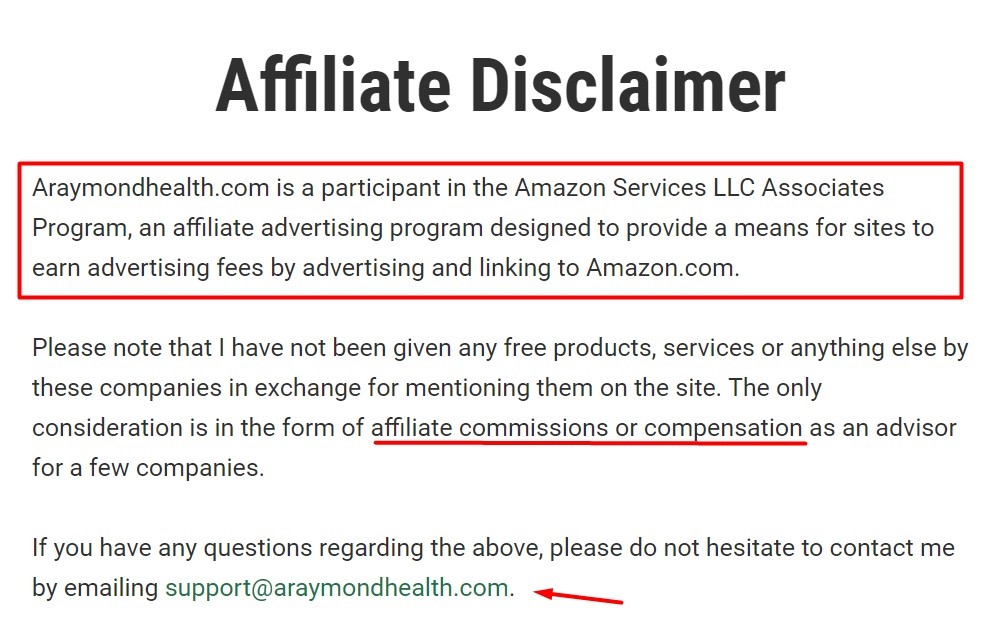
Next we will take a look at copyright notice disclaimers and how they can protect the health related content you work so hard to produce.
Copyright Notice Disclaimer
Most businesses include a copyright notice disclaimer, which protects your content from being used elsewhere without express permission. A copyright notice disclaimer serves to protect any of your written guides, instructional videos, and infographics, among other personal content.
Andy Rubie lets users know that all of the content on his website is copyrighted, and that none of the materials may be reproduced or distributed without his written permission:
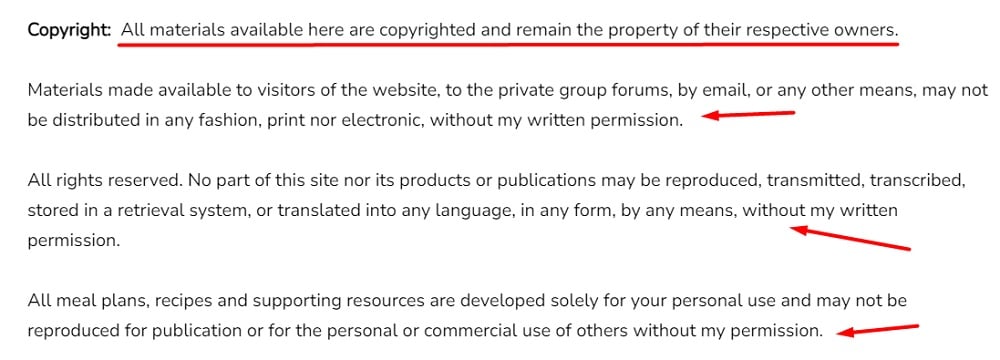
Another disclaimer that many health coaches use is an email disclaimer, which helps to protect the content of their emails and newsletters.
Email Disclaimer
An email disclaimer protects your business by letting users know that the email is not a legally binding document and that the information and attachments within the email are confidential.
Jessica Dawn reminds users that technology is fallible and that there are confidentiality risks whenever information is shared over email or via other technology:

To err is human, but it's important to make sure that users know that you won't be held liable for any damages they may incur due to incomplete information on your website or other platforms.
Errors and Omissions Disclaimer
This disclaimer helps to protect you from any harm that may occur to users due to mistakes or missing information within your content.
Kate Vogel lets users know that she is not responsible for any errors or omissions within her website:

If you share links to other sites on your website or blog, you might want to consider adding an external links disclaimer, which we will cover next.
External Links Disclaimers
When you link to other sites, you don't have control over the content that they share, and an external links disclaimer lets users know that you don't necessarily agree with or endorse the opinions shared by those sites.
Dixie Reynolds' links to external sites disclaimer tells users that while she tries to link to reputable sources, she is not held responsible for any of the views or content expressed by third parties:

Another common type of disclaimer is a fair use disclaimer, which should be used any time you repurpose content that has been created and copyrighted by others.
Fair Use Disclaimer
A fair use disclaimer tells users that your website may legally use copyrighted content from other sources. You can use copyrighted content without obtaining a license from the person or business that holds the copyright when commenting on, criticizing, or parodying the copyrighted work.
Caralyn Hale's copyright disclaimer includes a fair use portion in which she lets users know that any copyrighted material that she uses on her website makes up less than 10% of any given post, and is linked to the owner:

Next we will take a look at financial disclaimers.
Financial Disclaimer
Financial disclaimers let users know that you are not a financial advisor and that you are not responsible for any financial damages or losses that users may incur.
Lynne Wadsworth uses her earnings disclaimer to tell her users that she takes no responsibility for their business decisions or financial results:
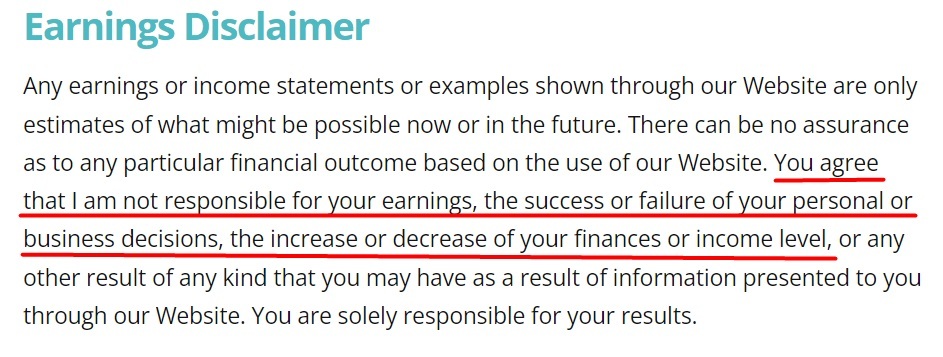
Many health coaches sell supplements, shakes, tinctures, and other ingestible items that require the use of a no responsibility disclaimer, which we will take a look at next.
No Responsibility Disclaimer
A no responsibility disclaimer informs users that you have limited liability for any damages that may occur from using your products or services. This is an important disclaimer to include if you are selling any consumable health products or providing services that could potentially result in bodily harm.
Ted Huntington's disclaimers include an agreement that users take personal responsibility for their well-being, choices, and decisions during and after their coaching sessions:
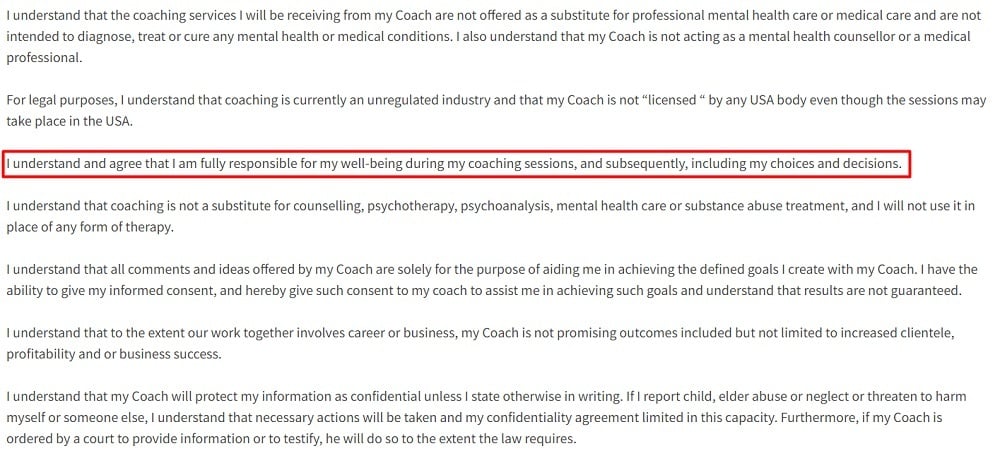
Next we will go over a disclaimer you can add if you plan on using your clients' reviews for marketing.
Reviews Disclaimers
Reviews and testimonials are an excellent form of marketing for health coaches, and it's a smart business practice to ask happy customers to leave a good review on your website or social media platform.
If you plan on retaining rights to any reviews left by customers, you should include a reviews disclaimer to let them know that you intend to use their reviews for advertising purposes. You can also use a reviews disclaimer to let users know that testimonials do not mean that all users will get the same results.
Jenna Cornell uses her testimonials/examples disclaimer to tell users that testimonials are examples of what is possible, and not a guarantee of results:

You may also want to include a use at your own risk disclaimer, which lets users know that they take personal responsibility for any injuries they may incur.
Use at Your Own Risk Disclaimer
A use at your own risk disclaimer can be included anytime you are selling a product or service that could potentially result in injury or harm. A use at your own risk disclaimer should be included if your health coaching business offers exercise equipment or programs or any kind of ingestible products.
Kathy Borthwick's disclaimer tells users that she does not assume responsibility for losses, damages, or injuries that occur as a result of using the information contained on her website:

Another disclaimer that many health coaches include on their websites is a views expressed disclaimer, which distinguishes your opinions as yours alone.
Views Expressed Disclaimer
A views expressed disclaimer is important if you share thoughts or opinions that may be conflicting with those of a parent company or associated partners. This type of disclaimer can also be used to show users that certain comments or guest posts made by others within your website only reflect the writer's opinion and not necessarily your own.
Tony Robbins' Health Disclaimer includes a views expressed section that tells users that the opinions expressed on his blog and website are not related to those of any other institutions:

Another important disclaimer to include on your website is a warranty disclaimer.
Warranty Disclaimers
Warranty disclaimers let users know that products and services are sold "as is" and do not come with any kind of warranty, or that they do come with some type of one. Including a warranty disclaimer for products you sell in your ecommerce store component of your health coaching business helps your customers to understand all that their purchase entails.
Julie Germaine includes a section in her Terms telling users that her website and content do not come with a warranty of any kind:

Once you have decided which disclaimers work best for you and your health coaching business, it's important to put them where people can easily find them. Let's take look at some methods for displaying disclaimers now.
Where to Display Disclaimers for Health Coaches

You can display your disclaimers on your website, blog, mobile and social media apps, and e-commerce stores. The key is to put them where they are easily accessible.
Website
Most people do some sort of online research before hiring a health coach, and your website is usually the first place they will go to find out more about you and the services that you offer. You can put a link to your disclaimers anywhere on your website, but adding a link to the footer is common practice and a great way to ensure that users can navigate to your disclaimers no matter where they are on your site.
Kim Eagan has a link to her disclaimer in her website footer, alongside her contact information:

You can also add a disclaimer to the blog portion of your website in individual posts for added security, as well as to your ecommerce store component.
Mobile Apps
Many health coaches create mindfulness apps or apps that track users' food intake or log their exercise. You can add a link to your mobile app disclaimer to any of these apps via a Settings, Legal or other menu.
Adding a disclaimer to your social media apps serves the purpose of informing your users of your rules of conduct, right to remove or change content, and any warranty information for your services or products.
Adding a disclaimer to your email ensures that everyone who receives communication from you has access to your legal liability information. Consider adding a short disclaimer to the bottom of your emails, or add a link to your official disclaimer page.
Summary
Health coaches should include disclaimers on whatever online platforms they use in order to limit their liability.
Common disclaimers for health coaches include:
- Medical advice disclaimers
- Affiliate disclaimers
- Copyright notice disclaimers
- Email disclaimers
- Errors and omissions disclaimers
- External links disclaimers
- Fair use disclaimers
- Financial disclaimers
- No responsibility disclaimers
- Not medical advice disclaimers
- Past performance disclaimers
- Reviews disclaimers
- Use at your own risk disclaimers
- Views expressed disclaimers
- Warranty disclaimers
While disclaimers are not necessarily legally binding, they are an important element of your online presence and serve an educational and protective purpose for your health coaching clients.

Comprehensive compliance starts with a Privacy Policy.
Comply with the law with our agreements, policies, and consent banners. Everything is included.
